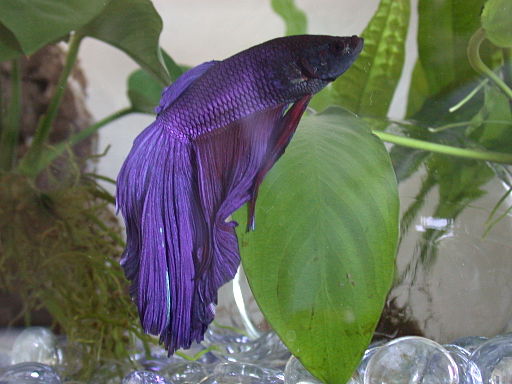Have you ever wondered if your betta fish ever sleeps? This is not a silly question. It is one that many betta enthusiasts have asked at one point or another. In fact, the answer about betta fish and their sleeping habits may surprise you.
All fish need sleep
The fish can not get into bed at night, but everyone is asleep at one time or another. Fish that are primarily active at night sleep during the day. Fish like bettas that are mainly active during the day sleep most of the night.
What does a sleeping betta fish look like?
The question remains whether bettas experience to sleep in exactly the same way as people. After all, they can’t close their eyes because they don’t have eyelids. So it is not immediately obvious what they are doing. Do they completely lose consciousness like people? Maybe not, as they are very territorial and are constantly vigilant against intruders, even if they are the only fish in their tanks. Still, they seem to take time to rest, and this is the equivalent of sleeping for humans.
How to know when your betta is sleeping
Now that you know that bettas (and all fish) really do sleep, you may be wondering how you know when they are. You can assume that a betta will take the opportunity to get some rest every time their surroundings get dark. This usually happens when your tank light is turned off at night. After a short time, you will find a comfortable place to rest and basically go idle for a while until something startles you or the light returns.
Bettas can take short naps during the day
Bettas sometimes take short naps during the day. If you have ever noticed that your pet lies in the bottom of your tank doing nothing, in particular, it could be asleep. In other cases, your fish can sit still on top of their tank while he rests. Some people are scared when they find their betta in either state because they think their pet is dead and in fact, there is not much difference in how a sleeping betta and a dead betta look. Fortunately, the fish is simply asleep in most cases.
 Blue Betta Fish by Dvortygirl
Blue Betta Fish by Dvortygirl
Bettas also take infrequent naps during the day. You may notice that your fish are resting at the base of a plant, or perhaps they are even resting among the leaves. Bettas like to find a safe place to rest when they can, so they will explore places under or inside tank ornaments, behind filters, and anywhere else that makes them feel safe from harm. You can create ideal sleeping places by adding a bushy plant, either real or artificial but soft, or by supporting a piece of slate on the side of the tank.
How to tell the difference between a sleeping betta fish and a dead one
Since sleeping bettas can float on top of a tank or lie down on the bottom, it is easy to mistake a sleeping fish for one that has died.
There are some clear indications that your fish is close to death, or that it has already died if you have seen these signs and are not moving now.
- They’ve recently seemed lethargic, staying in the bottom of the tank without moving, or in a hiding place, for days.
- They were swimming strangely like they’re out of balance.
- Coloration seems less vibrant than usual.
- Their eyes seem too big and as if they are moving out of the body, what is called “popeye”.
- The Betta fins appear jagged and unhealthy, or pressed against their bodies instead of spreading and flowing.
- Fins appear discolored with white spots around their body or if they appear to have shiny metallic spots that are easier to see with a flashlight.
- The Betta’s scales seemed to be raised and pointing away from their body, and your belly is swollen so that it looks like a pineapple when viewed from above.
- No interest in food.
If you have noticed any of these signs in the last days or weeks, and your betta is now immobile, you can realize that it has died, especially if I show the following signs:
- They don’t seem to be breathing when you check their guts and their mouth. The easiest way to do this is to use a fishing net to get it out. If you don’t move away from the net and are still and not breathing, this is likely a sign that you are dead.
- If you are lying on the bottom of the tank, either on your side or with its back floating slightly upwards, while your head is against the bottom of the tank or on the substrate. Or, if you are not lying on the bottom of the tank, but you are floating on the side surface.
- Its color is faded and its eyes are dull.
 Betta next to plants by Khruner
Betta next to plants by Khruner
Water shock in a betta
If your betta fish doesn’t show any of the signs of illness and suddenly appears dead, you may want to check the water temperature in your tank first. Bettas in cold water or water that needs to be treated for ammonia and other chemicals can be physically shocked and may appear lethargic. Sometimes they can even appear as if they are dead and floating with an opaque color. But in reality, they are not. If you suspect that your betta is in a water crash:
- Test the water temperature, which should be at least 74 ° F / 23 ° C and preferably between 78 ° F and 82 ° F / 25 ° C and 27 ° C.
- If the water is below 74 ° F / 23 ° C degrees, use a tank heater to raise the temperature to the correct level.
- Watch your betta after the water is warm enough for them. If it continues to float and does not move, it is likely dead. If it appears to be regaining its color and is eventually moving, then it may have been in shock and is recovering now that its water is warmer.
Let your fish rest
It is important that all living creatures rest, so resist the temptation to touch your betta’s tank to check if it is still alive when you find it lying down somewhere. Chances are they are just sleeping. They’ll soon wake up and start exploring their surroundings again happy and content.

![240_F_285678310_MF5UYEZrOYbXOsfhizsBYKqOCWnF7MPJ[1] Betta Fish](https://i0.wp.com/bettabetta.com/wp-content/uploads/2020/06/240_F_285678310_MF5UYEZrOYbXOsfhizsBYKqOCWnF7MPJ1.jpg?resize=360%2C240&ssl=1)